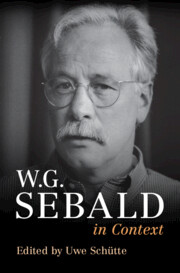Book contents
- W.G. Sebald in Context
- W.G. Sebald in Context
- Copyright page
- Dedication
- Contents
- Illustrations
- Notes on Contributors
- Preface
- Acknowledgements
- Note on Text
- Chronology
- Abbreviations
- Works by W.G. Sebald
- Part I Biographical Aspects
- Part II The Literary Works
- Part III Themes and Influences
- Chapter 17 Critical Writings
- Chapter 18 Minor Writing
- Chapter 19 Franz Kafka
- Chapter 20 Literary Predecessors
- Chapter 21 Walter Benjamin
- Chapter 22 Philosophical Models
- Chapter 23 History
- Chapter 24 Polemics
- Chapter 25 Holocaust
- Chapter 26 Photography
- Chapter 27 Paintings and Ekphrasis
- Chapter 28 Media Theory
- Chapter 29 Travel Writing
- Chapter 30 Ecocriticism and Animal Studies
- Part IV Reception and Legacy
- Further Reading
- Index
Chapter 18 - Minor Writing
from Part III - Themes and Influences
Published online by Cambridge University Press: 24 August 2023
- W.G. Sebald in Context
- W.G. Sebald in Context
- Copyright page
- Dedication
- Contents
- Illustrations
- Notes on Contributors
- Preface
- Acknowledgements
- Note on Text
- Chronology
- Abbreviations
- Works by W.G. Sebald
- Part I Biographical Aspects
- Part II The Literary Works
- Part III Themes and Influences
- Chapter 17 Critical Writings
- Chapter 18 Minor Writing
- Chapter 19 Franz Kafka
- Chapter 20 Literary Predecessors
- Chapter 21 Walter Benjamin
- Chapter 22 Philosophical Models
- Chapter 23 History
- Chapter 24 Polemics
- Chapter 25 Holocaust
- Chapter 26 Photography
- Chapter 27 Paintings and Ekphrasis
- Chapter 28 Media Theory
- Chapter 29 Travel Writing
- Chapter 30 Ecocriticism and Animal Studies
- Part IV Reception and Legacy
- Further Reading
- Index
Summary
This essay examines Sebald’s preference for eccentrics, amateurs and dilettantes, whose nonconformist views were incompatible with a scientific worldview or technocratic views. These were of concern to Sebald because he felt that theories and views disqualified from official discourse would offer an untapped pool of knowledge for his writing. The essay first discusses the significance and function of amateurs and dilettantes in Sebald’s narrative work as well as eccentric traits of his character. It then applies the concept of “minor writing” (Deleuze/Guattari) to Sebald’s texts and discusses the influence of academic outsiders such as Rudolf Bilz or Rupert Sheldrake. Sebald’s essays on Herbert Achternbusch and Ernst Herbeck provide examples of his use of these minor writers as inspiration for his own writing.
Keywords
- Type
- Chapter
- Information
- W. G. Sebald in Context , pp. 156 - 167Publisher: Cambridge University PressPrint publication year: 2023
- 1
- Cited by

